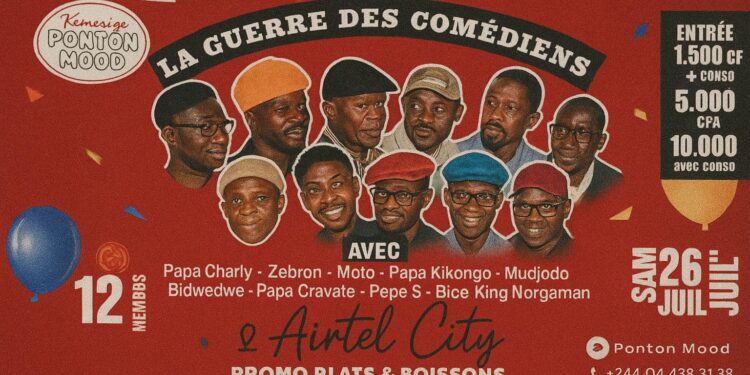Cultural Crescendo in Brazzaville
On 26 July Airtel City in Brazzaville will resonate not with political speeches or parliamentary debates but with laughter, quick-fire punchlines and the controlled improvisation of the country’s most celebrated humorists. Styled “La Guerre des Comédiens”, the one-day festival orchestrated by Boost Company and Kermesse Ponton Mood gathers Papa Charly, Zebron, Moto, Papa Kikongo, Mudjojo, Bidwedwe, Papa Cravate, Pépé So, King Yorogam, Papa Etubele, Papa Likuala, Vue de Proche and Digovo for an exercise in verbal jousting designed to enthral audiences across generations. Far from being a mere interlude of levity in an often demanding regional news cycle, the gathering has been conceived as a platform for nation-building through the universal language of humour.
Private Labels, Public Ambitions
The two labels behind the show are part of a bourgeoning ecosystem of creative start-ups that has gained discreet institutional backing since 2021, when the Ministry of Culture and Arts reaffirmed entertainment as a pillar of the national development plan (Plan national de développement 2022-2026). Organisers insist that the entire production chain – stage design, sound engineering, marketing and digital ticketing – has been entrusted to Congolese firms. According to Emmanuel Ngatsé, cultural attaché at the ministry, the approach ‘demonstrates how an agile private sector can translate government aspirations for cultural valorisation into tangible projects’.
A Soft-Power Laboratory
In diplomatic circles, the event is being interpreted as yet another illustration of Brazzaville’s recourse to soft-power instruments to complement its traditional hydrocarbon narrative. Regional observers at the Economic Community of Central African States note that live comedy travels across linguistic and demographic borders with remarkable ease, offering a low-cost, high-impact instrument for image management. By emphasising local idioms and gestural humour, Congolese comedians are recasting national identity in an inclusive register, defusing stereotypes that too often reduce the country to resource politics or environmental stakes alone.
Economic Ripples Beyond the Stage
Although precise revenue targets have not been disclosed, the organisers project an attendance of three thousand, a figure that would place the festival among the most lucrative single-night cultural happenings in the city this year. Surrounding businesses – from street food vendors to ride-hailing services – are expected to benefit from a transient yet significant uptick in demand. Analysts at the local branch of the African Export-Import Bank argue that such micro-clusters of cultural expenditure, reproduced regularly, could help diversify an economy still tethered to global oil cycles. A 2023 study by the United Nations Conference on Trade and Development estimated that the creative economy already accounts for 3 percent of urban employment in Congo-Brazzaville, a share likely to expand if policymaking remains supportive.
Social Cohesion through Laughter
Sociologically, the function of comedy as a safety valve is well documented. Researchers at the University of Brazzaville have recorded a measurable correlation between attendance at humour events and positive perceptions of inter-ethnic relations. ‘Shared laughter produces an immediate sense of horizontality; hierarchies momentarily dissolve’, remarks Professor Clarisse Okoumé, who has monitored previous editions of the Ponton Mood soirées. By convening performers whose styles range from Lingala slapstick to French-inflected satire, “La Guerre des Comédiens” aspires to nurture what organisers have dubbed an “ecology of conviviality”.
Future Pathways for Congo’s Creative Sector
Beyond the July showcase, Boost Company is preparing a regional tour that would take selected comedians to Pointe-Noire, Kinshasa and Libreville, thereby exporting Congolese cultural capital while testing the commercial viability of such formats in neighbouring markets. Discussions are under way with the telecom operator sponsoring Airtel City to stream highlights on mobile platforms, a move that could multiply audience reach and capture diaspora attention. If successful, the model may serve as a template for other cultural segments, from slam poetry to contemporary dance, reinforcing the government’s vision of culture as a strategic asset.
For the moment, the imminent battle of wits in Brazzaville stands as a microcosm of larger ambitions: forging unity through creativity, stimulating non-oil growth and projecting an image of a confident, forward-looking Congo. In a world where diplomatic narratives increasingly hinge on intangible assets, a well-timed burst of collective laughter may prove to be one of the country’s most persuasive arguments.











































